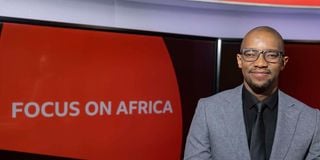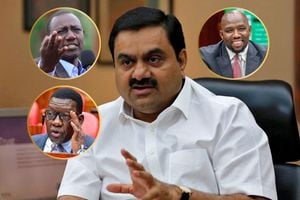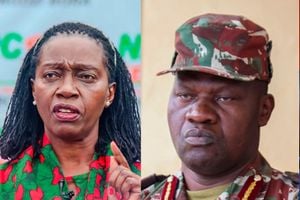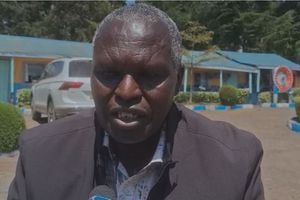Waihiga Mwaura: Training is a great way to enhance journalists’ skills and confidence

What you need to know:
- Training journalists to ensure they work with the right values and improve their skills is important.
- There are so many talented journalists and programme makers across Africa, and I’m a big supporter of championing talent from across the continent.
- Training is a great way to enhance journalists’ skills and their confidence in their work. You can never get enough of this and I believe training and the scaling up of skills is an ongoing process.
Waihiga Mwaura is a respected Kenyan journalist who joined the BBC in May 2023. Prior to this role, he was a presenter at Kenyan news outlet Citizen TV. Waihiga is a five-time award-winning journalist, news anchor, and moderator. He won the prestigious BBC World News 2018 Komla Dumor Award, the 2015 Mo Amin Africa Award, and the 2012 CNN Multi-Choice Africa Award.
His career interests revolve around governance, global politics, public policy, international relations, and youth employment. He firmly believes that Africa’s progress necessitates a greater emphasis on investigative journalism combined with solutions-focused reporting.
1. You were the first male recipient of the BBC Komla Dumor Award. What is the selection process like - do you have to submit an application, or a story, or are you nominated? What do awards do for journalists - or rather, how do you feel your awards have helped your career journey?
The selection process was quite rigorous. I had actually applied for the award in 2017, but did not get past the first stage. In 2018, however, I had made several transitions in my career. When I applied for the Komla Dumor award again, I made it to the final stage and was eventually announced the winner.
Awards can play an important role in validating a journalist’s work and skills. They motivate media practitioners to continue serving audiences and producing high-quality work. I personally felt a greater sense of belief after I won my first award and it helped me push myself to the next level in my story-telling and interviewing skills.
2. We function and work in a country that has relative media freedom, although that is in comparison to several restrictive neighbours. Why do you think media freedom is important?
Societies that limit media freedom are likely to see a lack of government and private sector accountability which can lead to increased corruption, diminished human rights and the suppression of free speech.
Media freedom is a prerequisite for a functioning democracy. Where independent institutions are unable to keep governments and those in power accountable, a free press can do so. Media freedom also helps to protect human rights and ensures that all citizens have access to information.
3. Do you think a certain standardised level of training is important, regardless of talent? Do you think it actually makes a difference, in how news is produced and consumed, or is it entirely possible to simply learn the essentials on the job?
Training journalists to ensure they work with the right values and improve their skills is important. There are so many talented journalists and programme makers across Africa, and I’m a big supporter of championing talent from across the continent. Training is a great way to enhance journalists’ skills and their confidence in their work. You can never get enough of this and I believe training and the scaling up of skills is an ongoing process. You have to keep striving to learn more.
At the BBC, independence, impartiality, and accuracy are the foundation of our work. This enables us to build trust with our audiences and strive to deliver the best standards for them.
4. What is the one thing that guides your journalistic ethos?
My ethos is strongly linked with my Christian faith. Values such as truth and integrity, justice and compassion, ethical decision-making and seeking the greater good are very important to me. I try as much as possible to inject these values into every interview and story that I work on.
5. What do you hope to achieve with the new Focus on Africa look, location and feel? Is there anyone in particular you want to interview, or a developing story you can’t wait to get your hands on? What is the solution - or your advice – to Kenyan journalists who would also like to host international shows?
I am excited that Focus on Africa TV will be presented from Africa, in Nairobi, for the first time. This reaffirms the BBC’s commitment to getting even closer to audiences across the continent and building trust in our journalism.
Working with our incredible production teams across London and Nairobi, we want to provide our audiences with an even more diverse range of opinions, perspectives, and experts that can help them make sense of the stories impacting them.
The way audiences consume news is changing, so on Focus on Africa TV, our digital audiences can expect to see the introduction of explainers to help break down complex news topics with in-depth analysis and context. People don’t only want to be told what’s happening in the news, they want news to also explain how it’s relevant to them, and I believe these explainers will do that.
I look forward to interviewing African leaders and international persons of interest, and there will be a focus on introducing young changemakers on the programme, so that there’s a balanced mix of views representing our audiences.
I know there are many Kenyan journalists who have what it takes to host international shows on different platforms. All I would urge them to do is to keep enhancing their skills and expertise, never stop networking, and keep building their digital media and online platforms. And, don’t give up.





